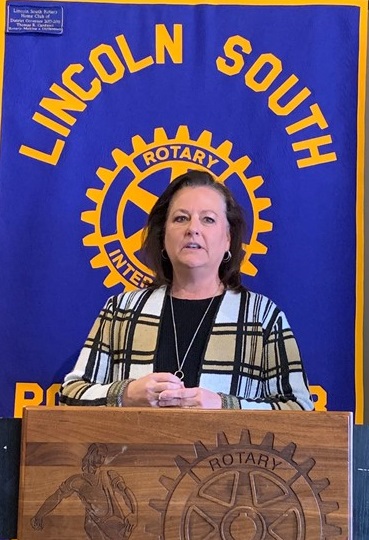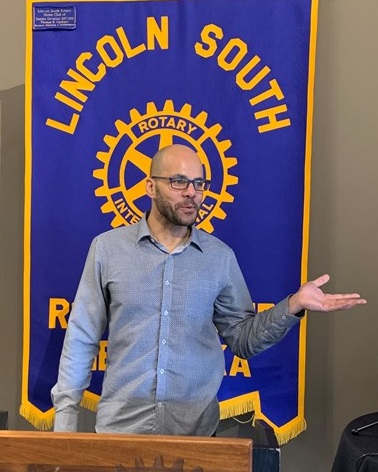"Why not Lincoln?"
When Rhonda first learned about and saw the small villages in Oregon she asked that question "Why not Lincoln"? She told us that the small villages have provided safe, affordable homes for homeless or formerly incarcerated population in many cities with great success.
The organization Bridges To Hope provides services to the formerly incarcerated population. They provide tangible items to men and women upon their release. They get donated items and then redistribute them at no charge. From their donations, if their are non-essential items or other items they have not been able to distribute, they shared with other thrift shops. Then they decided to open their own thrift shop - Bud's Thrift Shop (named after the founder of Bridges To Hope). Last year the thrift shop brought in $100,000 and some of that is donated to Bridges to Hope.
During he presentation at Lincoln South Rotary Club she announced that there will be a Tiny Home Village built in Lincoln. Located across from the Matt Talbot Kitchen, the City is providing the land. The village will consist of 20 tiny homes (from 250 to 500 sf). These will be permanent houses owned by Bridges to Hope that are leased at $1 per sf. She said it is being developed to serve those formerly incarcerated but may also be open to homeless.
Rhonda emphasized that this is not transitional housing. She wanted to make that clear. Many are unhappy with development of transitional housing because there is lack of oversight
The Tiny Home Village is set up so that each home has a kitchenette and bathroom which allows residents to have their own space. There will also be a community building in the village that can be used for family gatherings. They will have a coin-operated laundry facility available to the residents. The village is secure and safe. There will be a garden so the residents can grow fresh produce.
The parking lot will be well-lit. There will be police there regularly to help keep it safe but also to allow some socializing between the residents and the police. Also, they are moving the collection center to the community center. That will ensure that services are available 7 says a week. All staff are also on call 24 hours a day to ensure that they can provide support.
They are working on getting community support. For example, White Castle roofing will be donating 4 roofs. They are also working on a general contractor. They are working with corrections to provide the labor. This will provide something to keep the prisoners busy while they are incarcerated but also provide training for a skill they may be able to use once released.
Rhoda believes this will be contagious. This will be the first Tiny Home Village in Nebraska and, once people see how successful it is, more will be developed.
Then Rhonda introduced Jason.
Jason shared his experience and talked about how organizations like Bridges To Hope can help people turn around. They provide support. They don't judge.
He had a hard life - starting from when he was very young. At the age of 4 he was in a house with domestic violence. He assured us that a child - even that young - remembers traumatic events.
He lived with an aunt and uncle for a while but then went into the foster care system. He moved around a lot - Plattsmouth, Syracuse, Auburn, Lincoln and Omaha.
It was a hard life and he was a very dark person. He started to hang out with bad kids. In the 80s he was one of the kids on skateboards that terrorized neighborhoods vandalizing property.When the gangs came into Lincoln he saw that as a place where he could feel like he belonged.
He was incarcerated at age 18. He hardened while in jail and got more aggressive. Getting in trouble again, he found himself back in jail for a longer time. He spent a total of 21 years in jail.
Prison does not rehabilitate a person. However, as he got older and realized that his 20s were gone - then his 30s were gone - he found ways to belong to positive clubs. He found others that had matured and they supported each other. As he developed away from his dark spaces he realized that everyone that was in a good space had a connection. He found his connection - volunteering.
Now he wants to help others. He wants to see people do better in their life. With support they can be successful.
BIO:
Rhonda Mattingly has over 20 years’ experience in grant writing, fundraising and executive management and over 14 years’ experience working for non-profit agencies.
After her personal experience in a domestic violence relationship she returned to college where she attained a degree in Psychology with a minor in Sociology from Wayne State College.
She put that degree to use first as a Child Protection & Safety worker for the Ponca Tribe of NE and later was selected as Executive Director for a non-profit Domestic Violence and Sexual Assault agency in Norfolk.
Rhonda and her two children moved to Lincoln in 2005 where she worked for UNL in the Bureau of Sociological Research Department, as Director of Operations, for a grant funded study with Native Americans. Once the project was complete, she stayed with UNL as a Budget/Business Coordinator for the College of Education and Human Sciences.
The non-profit arena is her passion so she feels back at home as the Executive Director for Bridges to Hope since February of 2015 and Founder of Bud’s Thrift Shoppe since November of 2017.

